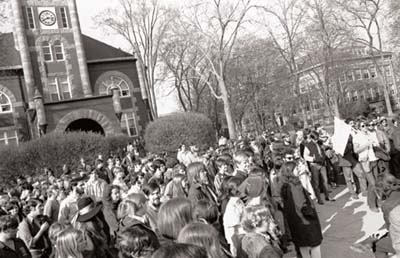 |
 |
| current issue |  | past issues |  | send a letter/news |  | address update |  | advertise |  | about us |  | alumni home |
Features
|
Riot Act
Forty years ago, UNH was a quiet campus. In a matter of days, all that changed. By C.W. Wolff Photography by Nicholas Wallner '71 Also see: Where are they now? Note to alumni: Please help identify the students in 1970 photos |
Easy to print version Make a comment |

|
It's 1 p.m. on May 5, 1970. Several hundred students are gathered around the flagpole in front of T-Hall, jabbing their fists in the air and chanting "Strike! Strike! Strike!" At the mike, philosophy professor Paul Brockelman warns the crowd, "We have to be careful with those policemen. We have to be careful with those National Guardsmen. We must be sure as we can be that we do not allow them to get into the position where they can pull the trigger." For many, there was something surreal about the turn of events that had created a fear of violence on the UNH campus that day, among not only student leaders but also the university president and New Hampshire attorney general, who would spend the afternoon in an office in the Field House, ready to call on the state police and National Guard soldiers stationed on alert nearby.
Only three years earlier, UNH freshmen still wore beanies. Girls, not yet insisting they be called women, wore skirts to class; many boys wore jackets and even ties. Dormitories were segregated by gender, and curfews (for women) were enforced. Students tended to trust that the president—whether of the United States or the university—knew what he was doing. For Jan Harayda '70, the general peace and beauty of the campus was what had attracted her to UNH in the first place. "I had a lovely experience for four years," she says, "and then the campus exploded."
By the end of the decade everything had changed. It wasn't just sex and drugs and rock 'n roll, although those were, of course, part of it. But those years—once described by sociologist Todd Gitlin as "a cyclone in a wind tunnel"—also included the civil rights movement, Black Power, women's liberation, the campus free speech movement, the first Earth Day, gay rights. And there was the Vietnam War. By 1968, more than half a million U.S. troops were stationed in Southeast Asia, with, on average, 770 coming home in boxes each month. On Dec. 1, 1969, many young men at UNH had watched as birthdates were pulled out of big glass jar on national television—"Mayberry RFD" had been preempted—in the first Vietnam-era draft lottery.
The first rumblings of student unrest at UNH that spring came when a sit-in was staged at the liberal arts dean's office to protest the treatment of a popular political science instructor. Mark Wefers '73, president of the student body, was walking across campus on his way to yet another University Senate meeting to address this crisis when he was handed a telegram from an agent for the notorious anti-war activists known as the Chicago Seven. After a five-month circus of a trial, all had been acquitted of conspiring to incite a riot outside the 1968 Democratic National Convention in Chicago. (Although five were found guilty on a second count of crossing state lines with intent to incite a riot, the convictions would later be overturned on appeal.) Seizing the opportunity to awaken the placid campus to some of the burning issues of the day, Wefers quickly arranged for three of the seven to speak at UNH on May 5 for a fee of $5,000.
The Chicago Three, as they became known at UNH, were longtime pacifist David Dellinger and Yippies co-founders Abbie Hoffman and Jerry Rubin. The goal of the Yippies, short for Youth International Party, was to build an anarchic, communal "new nation." Their theatrical tactics included an effort to levitate the Pentagon with incantations (which didn't work), to wreak havoc in the New York Stock Exchange by raining dollar bills down on the trading floor (which did work), and to nominate a pig for president. Sometimes called "Groucho Marxists," they were also known for over-the-top rhetoric, such as Rubin's frequent exhortation to "kill your parents," who, he said, "are our first oppressors."

|
At the other end of the political spectrum, newspaper editor William Loeb III was known for his own over-the-top rhetoric. After a mid-April demonstration in Cambridge, Mass., left 214 people injured, Loeb lashed out at protestors in a capitalized editorial on the front page of the Manchester Union Leader: "They Should Have Been Met by Blasts of Birdshot Aimed at Their Legs . . . If That Had Not Been Effective . . . They Should Have Been Met With Hard Ammunition Aimed at Upper Parts of Their Bodies."
On April 22, the Union Leader printed its first front-page story on the impending visit of the anti-war activists: "'Chicago 7' Rioters to Talk at UNH/Thomson Blasts Student Fund Use." The paper reported that Meldrim Thomson, who would become governor of the state two years later, had called the use of student fees to fund the speakers "a tactic on par with the most ruthless actions of totalitarian powers."
In subsequent stories, U.S. Sen. John McIntyre, a Democrat, said he wouldn't cross the street to hear "those nuts." Republican U.S. Rep. Louis Wyman '38 described them as "convicted hate mongers" and "despoilers of our society." And Republican Sen. Norris Cotton suggested they should be allowed to speak since they would "probably hang themselves... if given enough rope."
Easy to print version
blog comments powered by Disqus

